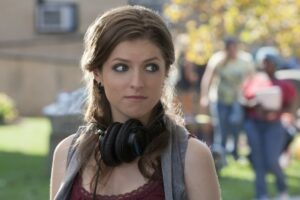Occasionally, two studios make the same movie and then try to be the first to release their version. It’s less common for the same year to produce two different films with almost identical storylines. But then, the plot for “Pitch Perfect” was old long before this year.
So it’s just a coincidence that “Pitch Perfect” has the same essential arc as “Joyful Noise” earlier this year. That film, which brought us the inevitable teaming of Dolly Parton and Queen Latifah, and “Pitch Perfect” are both about competitive choral work, with conflict focused on the battle between tradition and innovation.
Old-fashioned versus new-fangled – the eternal struggle. And it’s been more interestingly told before than it is in “Pitch Perfect,” Jason Moore’s by-the-numbers musical comedy.
Where “Joyful Noise” was about church choirs trying to be more melodic than thou, “Pitch Perfect” is about college-level competitive a cappella singing – the kind that’s always elbowing college football for airtime on Saturday afternoons in the fall.
Yes, it’s the same approach as on “Glee”: a cappella reworkings of inane pop songs (Kelly Clarkson’s name is invoked as though it is to be taken seriously), set to Broadway-musical-style choreography.
The film focuses on the rivalry between two nationally ranked groups from the same private college, mythical Barden. The Barden Bellas are the always-frustrated runners-up to their male counterparts, the Treble Makers. After a particularly humiliating experience at the finals at Lincoln Center (involving projectile vomiting), Aubrey (Anna Camp), the head of the Bellas, vows to take her troupe to the championship the next year.
This review continues on my website.

